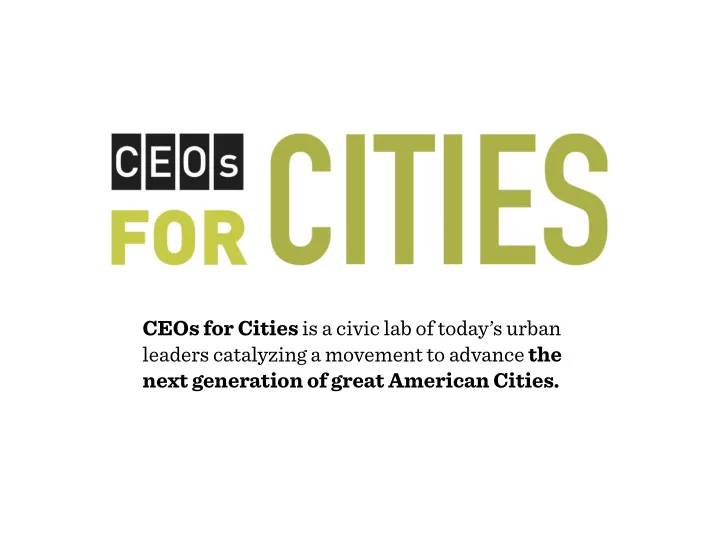

CEOs for Cities is a civic lab of today’s urban leaders catalyzing a movement to advance the next generation of great American Cities.
The Talent Dividend Sponsored by: CEOs for Cities
City Dividends
National Gains
Talent
Talent retention is key. Quality of place Quality of opportunity
The Approach • Cities differ in educational attainment • Differences reveal opportunities for improvement • Improvement gains estimated from evidence • Gains represent potential payback from better policies
Metro Variation in College Attainment Source: 2008 ACS Washington-Arlington-Alexandria, DC-VA-MD-WV (MSA) San Jose-Sunnyvale-Santa Clara, CA (MSA) San Francisco-Oakland-Fremont, CA (MSA) Boston-Cambridge-Quincy, MA-NH (MSA) Raleigh-Cary, NC (MSA) Austin-Round Rock, TX (MSA) Minneapolis-St. Paul-Bloomington, MN-WI (MSA) Denver-Aurora-Broomfield, CO (MSA) Seattle-Tacoma-Bellevue, WA (MSA) New York-Northern New Jersey-Long Island, NY-NJ-PA (MSA) Hartford-West Hartford-East Hartford, CT (MSA) Atlanta-Sandy Springs-Marietta, GA (MSA) Baltimore-Towson, MD (MSA) San Diego-Carlsbad-San Marcos, CA (MSA) Portland-Vancouver-Beaverton, OR-WA (MSA) Chicago-Naperville-Joliet, IL-IN-WI (MSA) Columbus, OH (MSA) Philadelphia-Camden-Wilmington, PA-NJ-DE-MD (MSA) Rochester, NY (MSA) Charlotte-Gastonia-Concord, NC-SC (MSA) Kansas City, MO-KS (MSA) Indianapolis-Carmel, IN (MSA) Milwaukee-Waukesha-West Allis, WI (MSA) Richmond, VA (MSA) Salt Lake City, UT (MSA) Los Angeles-Long Beach-Santa Ana, CA (MSA) Sacramento-Arden-Arcade-Roseville, CA (MSA) Dallas-Fort Worth-Arlington, TX (MSA) Miami-Fort Lauderdale-Pompano Beach, FL (MSA) Nashville-Davidson-Murfreesboro-Franklin, TN (MSA) St. Louis, MO-IL (MSA) Pittsburgh, PA (MSA) Houston-Sugar Land-Baytown, TX (MSA) Cincinnati-Middletown, OH-KY-IN (MSA) Providence-New Bedford-Fall River, RI-MA (MSA) Virginia Beach-Norfolk-Newport News, VA-NC (MSA) Cleveland-Elyria-Mentor, OH (MSA) Buffalo-Niagara Falls, NY (MSA) Phoenix-Mesa-Scottsdale, AZ (MSA) Detroit-Warren-Livonia, MI (MSA) Oklahoma City, OK (MSA) Orlando-Kissimmee, FL (MSA) Birmingham-Hoover, AL (MSA) Tampa-St. Petersburg-Clearwater, FL (MSA) Memphis, TN-MS-AR (MSA) San Antonio, TX (MSA) Jacksonville, FL (MSA) Louisville-Jefferson County, KY-IN (MSA) New Orleans-Metairie-Kenner, LA (MSA) Las Vegas-Paradise, NV (MSA) Riverside-San Bernardino-Ontario, CA (MSA) 0.0% 10.0% 20.0% 30.0% 40.0% 50.0%
The Hypothesis • Better-educated = higher incomes • Better-skilled = more innovation and productivity
The Evidence Education Explains Most Differences in Metro Income Annual Per Capita Income, 2005 NY $50,000 $48,000 SEA $46,000 HAR DEN MIN $44,000 PHI HOU BAL SAN y = 763.27x + 16466 2 = 0.5846 R CHI $42,000 MIA NO DAL LA MIL $40,000 PIT LV RIC CHA DET NAS IND STL KC JAC CLE BIR $38,000 RAL PRI SAC POR CIN AUS ROC COL ATL LOU OKC MEM TPA $36,000 SLC VB PHO BUF $34,000 ORL SAT $32,000 $30,000 15 20 25 30 35 40 45 Percent of Population with a 4-Year College Degree, 2006 Sources: BEA (Income), Census (Education)
Estimating the Gain • Each 1 percentage point increase associated with $763 increase in per capita income or about $1,900 to $2,290 per year for average household (2.5-3 people) • Important to note: education gains are product of shift in entire skill distribution - not just moving a certain number of people from no degree to college graduation
Shifting the Distribution Advanced Degrees Dropouts
Educational Attainment No. Talent Measures % of People Educational Attainment (Population 25 and Older) Less than High School 19.9% 725,236 High School Only 23.8% 867,368 Some College 22.6% 823,635 AA Degree 5.8% 211,375 Four-year Degree 27.9% 1,016,789 Educational Attainment of Young Adults (25 to 34) Less than High School 19.3% 172,195 Four-year Degree 27.3% 243,571 Talent Dividend Goal 28.9% Additional degree holders 36,444 Source: 2009 American Community Survey Houston-Sugar Land-Baytown, TX Metro Area
Why Focus on Educational Attainment? Source: Bureau of Labor Statistics, July 2011
Three-quarters of the workers that were fired over the last year were let go on a permanent, not a temporary basis. -- David Rosenberg, July 2009
Why Focus on Educational Attainment? Source: Bureau of Labor Statistics, Second Quarter 2011
Belief in Need for College Degree to Be Successful Is on the Rise Data from Public Agenda surveys of US adults from the past decade
Unemployed Americans More Likely to Feel They Need Degree to Succeed Unemplo nemployed ed Employed Emplo ed 65 52 43 32 Need Degree Don't Need Degree Need Degree Don’t Need Degree National survey of 872 likely voters conducted April 17-20, 2010 by Greenberg Quinlan Rosner
Houston's Talent Dividend If we increase Houston's college attainment rate from 27.9 percent to 28.9 percent ( 36,444 additional new grads )… The Houston Talent Dividend = $4.2 billion annually
Talent Dividend Metrics • On-time high school graduation rate • College continuation rate • Adult postsecondary participation rate • College completion rate • College graduate retention rate Moving the needle on any one of these while holding the others constant will lead to increasing postsecondary attainment. Moving the needle on all five will quickly accelerate cities reaching and surpassing their Talent Dividend goal.
Who Needs to Participate in Achieving the Talent Dividend Colleges & Universities – Increase retention and completion rates, increase enrolled adults, retain graduates in city, credits for experiential learning and portfolios Businesses - Flex time, flex place, classes on corporate campus, open house on occupations, accredited corporate education, identify employees with some college but no completion, tuition reimbursement Foundations - Align giving to reach goal, hold grantees accountable, measure and report results at key milestones, provide independent advocates
Who Needs to Participate in Achieving the Talent Dividend K-12 - Increase college-going behavior Nonprofits - Align programs to reach goal, take responsibility for results Government - Flex time, classes in city buildings, open house on occupations, identify employees with some college but no completion, tuition reimbursement Economic Development - Embed talent development and retention as a priority in strategic plan
National Talent Dividend Network • Foster cross-sector leadership and participation • Provide metrics for comparison • Share learning across cities • Accelerate local action
Talent Dividend Prize: $1 million for your city. Made possible with generous support from:
www.ceosforcities.org
Recommend
More recommend